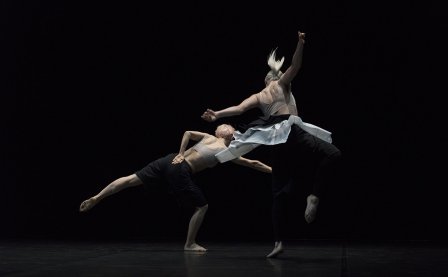There are two key things to keep in mind when listening to drone music. The first is that the genre represents some insane attempt to escape time. The second is that this attempt always fails. Both of these considerations are more than applicable to Duets, the third solo album by Tashi Wada, who just so happens to be the L.A.-based son of hallowed Japanese composer and Fluxus member Yoshi Wada. For Duets, Wada the Younger has enlisted cellists Judith Hamann and Charles Curtis to perform four original compositions that elongate and diffuse almost to the point of inert timelessness. But that’s “almost,” because for all the album’s creeping uncanniness and static pull, and for all the fixity with which it attempts to exclude movement and transform its deserted strings into a closed system, the elements of drift and randomness can’t help but infiltrate themselves into its catatonic mix, so that as 30 weightless minutes draw to a close, it’s time itself that reemerges as the album’s all-consuming linchpin.
Even so, Duets is replete with moments that’d dupe you into believing time no longer exists. “September 2006” begins with a long, suspended chord that holds its obstinate shape for what seems like an eternity, the two cellos effacing their own respective individualities in one pigheaded tone that’s impassive to the point of being jarring. Yet what’s so rewarding about this and the following pieces is that, even with their determination to maintain an unchanging oneness, they’re subject to infinitesimal drifts and deviations in pitch, with “September 2006” making periodical and subtle descents against its own will from one note to the other. The effect would be spectacular if it weren’t almost intangible — a vertiginous sinking feeling, one that abrades the sense of the duo’s control over the temporal world with the sense that this world is actually dragging them deeper into its cradle, engendering the events that constitute time just when they thought they’d somehow circumvented them altogether.
This insidious absence of ultimate mastery pervades all of Duets, despite the constant striving of Hamann and Curtis to freeze themselves in unbreakable perfection or, as Hamann writes in the liner notes, to “enter into a single moment.” “March 2007” is a liturgy of plucked quarter notes that repeat almost senselessly for over five minutes, as if Wada had been desperate to cocoon himself either in a denial of everything external to his own consciousness or in a denial of his own mortality and fallibility. However, the reassuring constancy of these crotchets is mocked by their own slow-motion plunge down several octaves, with this incremental shift heralding the approach of some unpalatable event while simultaneously fostering an uneasy atmosphere of dread. Moreover, the subliminal foreboding underlines an irony about the track’s desire to endlessly ping itself beyond time’s arrow, which is that, in the struggle to remove itself from change, it manages only to make the slight alterations that actually do occur sound all the more violent.
Yet aside from the foolhardy attempt to protect ourselves from the world’s flux, Duets is also a fascinating comment on human communication and interaction. With the smoky resonances of “April 2007” and the glassy timbres of “February 2008,” the two cellists manage to blend their strings into a single flue of unstructured breathing, confounding the expectation that, without a rigid score and its regularized notation to guide them, they would veer wildly from each other. Yet this doesn’t happen at any point during the two compositions, which in their telepathic swellings and outpourings respire in testimony to the possibility that our most significant exchanges unfold beyond significance, or to be less self-contradictorily dramatic, beyond the conventions of language and other formalized semiotic systems.
As true as this notion may be, it doesn’t quite square with the mercurial, semi-random complexion of Duets, which in its inexorable dispossessions and entropy would undermine the assertion that two individuals are engaged in a purposive exchange of information, rather than mutually adjusting in blank imitation of each other’s losses of control. However, the resonating amorphousness that follows from these momentary breaches, as well as the album’s stark, sense-depriving minimalism, serve to engender a vacuum into which a surprisingly rich diversity of emotions could be projected. In other words, Duets forces questions of whether “September 2006” is indignant or plaintive, whether “March 2007” is suspenseful or sleepy, whether “April 2007” is contemplative or confused, and whether “February 2008” is irrevocably dead or stubbornly alive. And as ever, the only way to answer these questions is to listen the album’s nearly inanimate vapor and superimpose yourself accordingly. Just take care not to lose track of time.
More about: Tashi Wada




